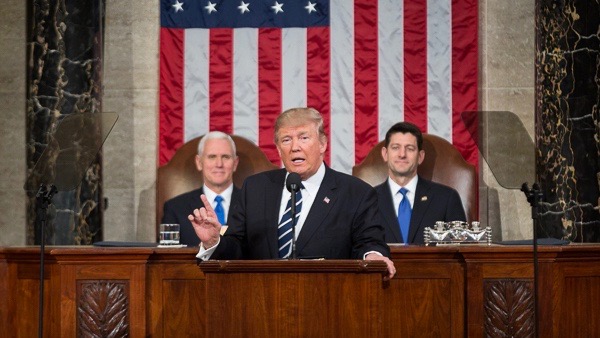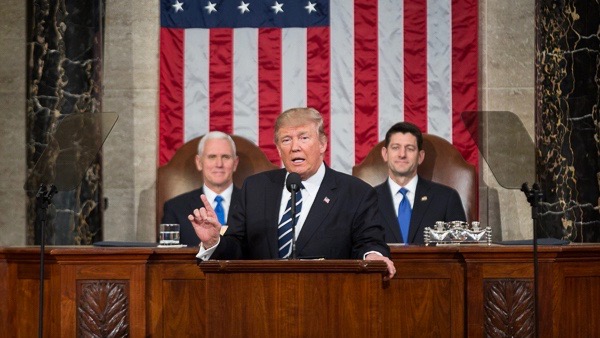
Office of the Speaker
The debt of the US government exceeded $ 20 trillion for the first time, according to the American edition of Business Insider. The country’s Ministry of Finance says that the amount of debt is $ 20,162 trillion. This is 108.6% of last year's US GDP ($ 18.569 trillion).
Debt increased by more than $ 300 billion in just a few working days. Last week, September 7, Congress canceled the ceiling of the national debt of $ 19.8 trillion. This limit was reached back in March this year and the administration of Donald Trump had to "shoot down reserves" in order not to start a battle with the debt and budget ahead of time.
However, the tension between the Congress and the administration of Donald Trump is growing. It may turn into a real conflict that could lead to a halt in the financing of the budget system (government shutdown). Similar things happened in October 2013, when the state was headed by Barack Obama.
The markets are anxiously waiting for the situation to develop. Some analysts warned that shutdown could be the starting point for a new crisis.
"If the debt limit is not raised, the consequences for the economy will be more catastrophic than the collapse of Lehman Brothers in 2008," said Beth Ann Bovino, chief economist at S&P Global Ratings.
She noted that the problems in the markets can nullify the achievements of the last few years to restore the economy. The chief economist of S&P did not exclude the possibility of a default and a return to the recession.
The probability of implementing such a negative scenario was quite high, given that the Congress is extremely unfriendly towards Donald Trump.
Yet, the administration and parliamentarians have suddenly been united by the hurricanes that hit the US. First, on August 25, Hurricane Harvey hit Texas and Louisiana, and then Irma came to replace it. September 10, the disaster hit Florida, the streets of Miami were flooded. Dozens of people have died in the US and other countries.
President of consulting company AccuWeather Joel Myers said that the total damage from Harvey and Irma will cost the economy of the US $ 290 billion, reports ABC television channel.
Myers clarified that this kind of damage will be a record for the country. "The damage from Irma will amount to about $ 100 billion, and from the hurricane Harvey - $ 190 billion. The total damage is estimated at $ 290 billion," said the president of AccuWeather.
Part of the losses will be covered by insurance companies, part – by the state-state authorities and the federal center will take over.
Last week, Congress passed a law on allocating $ 15.25 billion for liquidation of the aftermath of Hurricane Harvey,
Because of the emergency, Trump managed to postpone the budget battle with the Congress until December. Meanwhile, the US will continue to occupy the market. The amount of borrowing is expected to be record. According to the plan of the US Ministry of Finance, which was published in late July, treasury bonds worth $ 501 billion should be issued in October-December.
It is unclear whether these plans will be adjusted due to what had to be urgently borrowed in September. If the promised issue is preserved in full, it could provoke a growth in the dollar's rate to other currencies.
Much will depend on the meeting of the Committee on open market operations of the US Federal Reserve, which will be held next week. If the Fed raises the rate (now it is 1.25%), and also announces the parameters for clearing its balance sheet from the accumulated state and mortgage securities, then this can trigger a real dollar rally.
source: bloomberg.com
Debt increased by more than $ 300 billion in just a few working days. Last week, September 7, Congress canceled the ceiling of the national debt of $ 19.8 trillion. This limit was reached back in March this year and the administration of Donald Trump had to "shoot down reserves" in order not to start a battle with the debt and budget ahead of time.
However, the tension between the Congress and the administration of Donald Trump is growing. It may turn into a real conflict that could lead to a halt in the financing of the budget system (government shutdown). Similar things happened in October 2013, when the state was headed by Barack Obama.
The markets are anxiously waiting for the situation to develop. Some analysts warned that shutdown could be the starting point for a new crisis.
"If the debt limit is not raised, the consequences for the economy will be more catastrophic than the collapse of Lehman Brothers in 2008," said Beth Ann Bovino, chief economist at S&P Global Ratings.
She noted that the problems in the markets can nullify the achievements of the last few years to restore the economy. The chief economist of S&P did not exclude the possibility of a default and a return to the recession.
The probability of implementing such a negative scenario was quite high, given that the Congress is extremely unfriendly towards Donald Trump.
Yet, the administration and parliamentarians have suddenly been united by the hurricanes that hit the US. First, on August 25, Hurricane Harvey hit Texas and Louisiana, and then Irma came to replace it. September 10, the disaster hit Florida, the streets of Miami were flooded. Dozens of people have died in the US and other countries.
President of consulting company AccuWeather Joel Myers said that the total damage from Harvey and Irma will cost the economy of the US $ 290 billion, reports ABC television channel.
Myers clarified that this kind of damage will be a record for the country. "The damage from Irma will amount to about $ 100 billion, and from the hurricane Harvey - $ 190 billion. The total damage is estimated at $ 290 billion," said the president of AccuWeather.
Part of the losses will be covered by insurance companies, part – by the state-state authorities and the federal center will take over.
Last week, Congress passed a law on allocating $ 15.25 billion for liquidation of the aftermath of Hurricane Harvey,
Because of the emergency, Trump managed to postpone the budget battle with the Congress until December. Meanwhile, the US will continue to occupy the market. The amount of borrowing is expected to be record. According to the plan of the US Ministry of Finance, which was published in late July, treasury bonds worth $ 501 billion should be issued in October-December.
It is unclear whether these plans will be adjusted due to what had to be urgently borrowed in September. If the promised issue is preserved in full, it could provoke a growth in the dollar's rate to other currencies.
Much will depend on the meeting of the Committee on open market operations of the US Federal Reserve, which will be held next week. If the Fed raises the rate (now it is 1.25%), and also announces the parameters for clearing its balance sheet from the accumulated state and mortgage securities, then this can trigger a real dollar rally.
source: bloomberg.com


















